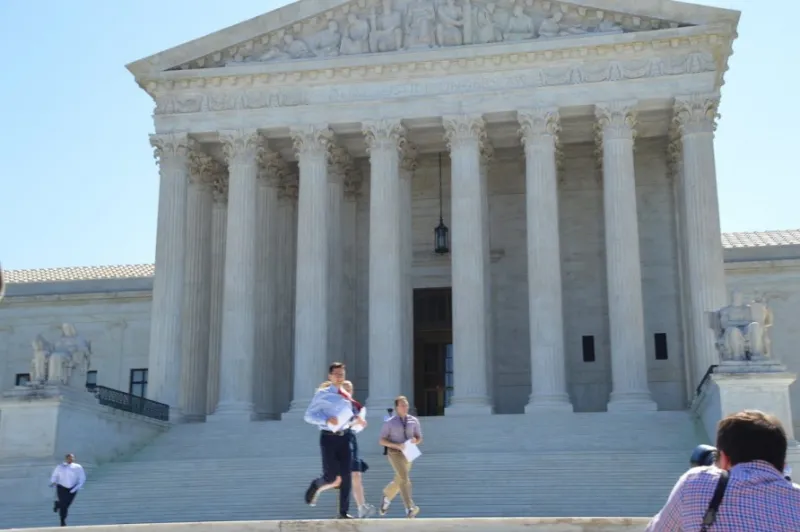
Washington, D.C. Newsroom, Sep 2, 2021 / 07:00 am (CNA).
A divided Supreme Court late Wednesday evening declined a petition to block Texas’ “heartbeat” law, allowing the law to stand for now.
Texas’ “Heartbeat Act” prohibits abortions once a fetal heartbeat is detected – which can be as early as six weeks into pregnancy. It is enforced by allowing private lawsuits in cases of illegal abortions.
The court, in a 5-4 decision on Wednesday, denied a petition for relief from the law by abortion providers. Justices Clarence Thomas, Samuel Alito, Neil Gorsuch, Brett Kavanaugh, and Amy Coney Barrett all ruled to deny the petition. Chief Justice John Roberts, as well as Justices Stephen Breyer, Elena Kagan, and Sonia Sotomayor, all dissented.
“Texas is the first state to successfully protect the most vulnerable among us, preborn children, by outlawing abortion once their heartbeats are detected,” stated Chelsey Youman, Texas state director for the pro-life group Human Coalition Action, in response to the court ruling.
The abortion providers did not make an argument sufficient to qualify for relief from the law, the majority ruled.
“The applicants now before us have raised serious questions regarding the constitutionality of the Texas law at issue. But their application also presents complex and novel antecedent procedural questions on which they have not carried their burden,” the majority stated.
The court majority emphasized that it was not judging the constitutionality of the law itself, but rather the case for relief from the law.
“In particular, this order is not based on any conclusion about the constitutionality of Texas’s law, and in no way limits other procedurally proper challenges to the Texas law, including in Texas state courts,” the court ruled.
In recent weeks, the pro-abortion groups suing over the law, represented by the Center for Reproductive Rights, had failed to successfully block the law in the lower courts.
On Monday, they appealed for relief at the Supreme Court. The law went into effect on Wednesday, Sept. 1, without the court having acted on the petition. Late Wednesday night, the court issued its decision.
Texas’ law allows for private citizens to sue over illegal abortions; they may take legal action against those performing or assisting in illegal abortions, including those providing financial assistance. The law allows for at least $10,000 in damages in successful lawsuits.
“Human beings are worthy of protection at all phases of development and the importance of a growing human in the womb cannot be undermined in good conscience,” Youman said.
Chief Justice John Roberts, in his dissent, noted the enforcement of the law by private citizens and not the state. He said he would have blocked the law temporarily, to give the courts more time to “consider whether a state can avoid responsibility for its laws in such a manner.”
Justice Stephen Breyer, in his dissent, said that Texas was still unlawfully prohibiting first-trimester abortions, which “a woman has a federal constitutional right to obtain.”
“The Court’s order is stunning,” said Justice Sonia Sotomayor in her dissent. “Presented with an application to enjoin a flagrantly unconstitutional law engineered to prohibit women from exercising their constitutional rights and evade judicial scrutiny, a majority of Justices have opted to bury their heads in the sand.”
“Without full briefing or argument, and after less than 72 hours’ thought, this Court greenlights the operation of Texas’s patently unconstitutional law banning most abortions,” Justice Elena Kagan wrote in her dissent.
The majority said that the abortion providers had not proven an injury from the named defendants in the case.
“[I]t is unclear whether the named defendants in this lawsuit can or will seek to enforce the Texas law against the applicants in a manner that might permit our intervention,” the majority wrote.
“The State has represented that neither it nor its executive employees possess the authority to enforce the Texas law either directly or indirectly. Nor is it clear whether, under existing precedent, this Court can issue an injunction against state judges asked to decide a lawsuit under Texas’s law,” the majority said.
“Finally, the sole private-citizen respondent before us has filed an affidavit stating that he has no present intention to enforce the law.”
This article was updated with new information on Sept. 2.
If you value the news and views Catholic World Report provides, please consider donating to support our efforts. Your contribution will help us continue to make CWR available to all readers worldwide for free, without a subscription. Thank you for your generosity!
Click here for more information on donating to CWR. Click here to sign up for our newsletter.





The 5th Vote
1973, seven men voted for death,
Sucker punched, out of breath.
Sixty two million children dead,
No words sufficiently said.
They simply fall to the ground,
The silent holocaust, not a sound.
Precious children we defile,
No judge, jury or trial.
Ecclesiastes, a time for everything,
Let all unborn children sing.
Time for a mother of seven to be number five,
The hearse for (Death) Roe about to arrive.
Walk on water, get out of the boat,
Way beyond time for the 5th vote.
I’m not a lawyer, but isn’t it true that there must be a clear injury in order for a court to rule on an issue? For example, Mr. Jones robbed my store, Mrs. Smith hit me with a baseball bat, or I am 10 months pregnant and “need’ to murder my child so I can stay in law school. Since the Texas law has no such case in existence, and no state official or judge has anything to rule on, how can a court decide the issue?